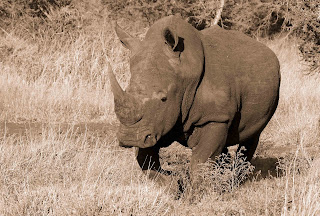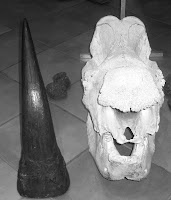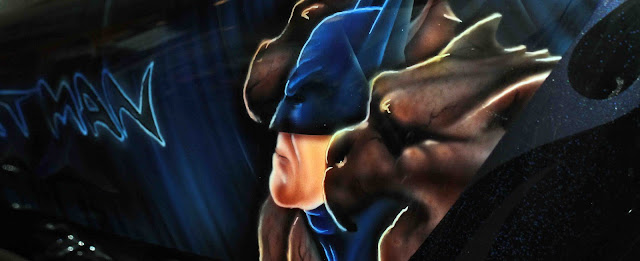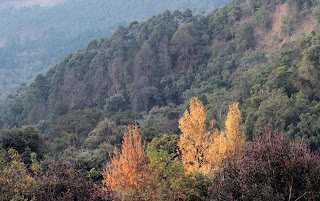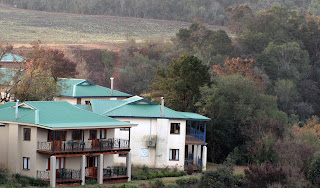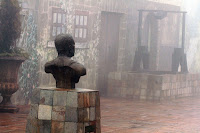There are places we find which remind us that time is eternal and our own time here, fleeting. Lesotho is such a place. We ramble on about big skies and grand scenery but Lesotho really is another world.
Measuring about 175km from top to bottom and some 220km from east to west it's about the size of Belgium. It's also the only country in the world situated entirely above 1300m.
Mountainous highlands dominate the eastern half of the country. People are sparse here and the economy is largely subsistence.
 |
| Lesotho vista - early winter |
In winter the climate in the valley is mild but in the highlands snow and ice are common. Temperatures of -15 degrees centigrade and below are also relatively common which is why many South Africans head to the high Berg ski-slopes.
Getting to these ski-slopes on the A1 from the north west is via the spectacular Moteng Pass; a meandering affair with gentle twists and turns in the lowlands to dangerously irregular hairpin bends as the road rises in earnest towards the east.
Cows, sheep, goats and donkeys have the right of way and in the valleys, crops dot the fields. Erosion is a serious problem and most of the indigenous fauna and flora is either locally extinct or threatened.

Young boys pursue right of passage and in the western lowlands tend their cattle. In the highest latitudes in the east, youngsters tend the family sheep and goats. Synonymous with Lesotho culture, most of the youngsters are clad in threadbare blankets and not much more. In winter these kids safely negotiate the sub-zero temperatures by rubbing sheep-fat into their blankets; odiferous but effective.
As the A1 winds eastward the road rises in earnest and is, even in the best conditions, very treacherous. Once dubbed '
the worst road in the world', now tarred, it's still the only access road to the east for large service vehicles (Letseng diamond mine) and holiday-makers alike. Occasionally these large vehicles lose control, veer across the verge and overturn. Under those circumstances it's not unusual to wait for 5 or 6 hours whilst the vehicle is cleared; a painstaking process..
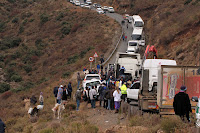
For most holiday-makers the resultant hold-up is distinctly frustrating. Even so, taking the time to enjoy a cup of coffee or a walk to the scene of the accident and interacting with Africa's most friendly people, is always rewarding. Under the most dire of circumstances very little aggression, if any, is prevalent among the local people.

As the road ascends, ice crystals cling to cliff-edges and streams are partly frozen. Vehicles are buffeted by the wind channeled through the pass. This physical assault and the views which stretch from one side of the world to the other, overwhelm the senses.
From the summit of Moteng Pass (2850m) the road descends gently. In winter it's fiercely cold.
Two establishments service the ski-slopes. The first along the road is Oxbow Lodge, some 10km from the Moteng summit. First impressions are poor; lasting impressions are dreadful. Avoid if possible. Afriski, some 15 km further along the road and near the Mahlasela Pass (3200m), is a much better option.
 |
| Oxbow Lodge - July 2012 |
These two resorts are usually booked six months in advance during the ski-season. This year was no exception and having booked too late we had to settle for Oxbow.
Privately owned since 1981 there's very little (ie: no) excuse for appalling service, bad food and dilapidated facilities. Notwithstanding, people do return.. I'm not sure why. A canteen-like food-hall plumbs new lows in hospitality. The management is inconspicuous and the staff, generally, grossly incompetent.
The picturesque Malibamatso River, against which the lodge nestles, is its only saving grace. Even that is ruined by raw sewage spilled from the lodge a little further downstream. All the rest is misery.
If you're able to ignore the displeasure of Oxbow this part of Lesotho is really special. Waterfalls are common, rivers (above Oxbow's sewage) are pristine and the views are absolutely breathtaking.
 |
| Malibamatso River - early morning ice |
It's a peaceful scene which is why it's difficult to imagine that Mother Nature is anything but benign... It's a serious miscalculation which, this time at least, caused untold strife.
 |
| Near Oxbow Lodge - Dawn light |
Lesotho is the land of
4-seasons in a day and in winter, particularly in these parts, that means, usually, a fiercely cold start, a late morning blizzard, an afternoon snow and evening ice.
South Africans, generally unequipped for extreme conditions and with variable driving experience, tend to make mistakes in extreme weather. When the wind's up and with 4x4 vehicles rushing from slope to slope, the compacted snow soon turns to ice..
As far as blizzards go this one was a monster. It arrived at 10am Saturday morning, unheralded, unannounced and with devastating effect. The world was, quite literally, painted white, ripped apart and turned upside down. Most people, happily enjoying an early ski, were caught cold...
 |
| Holiday makers flounder ahead of the storm |
Fierce winds, driving snow and sub-zero temperatures had most vehicles floundering ahead of the storm. The unlucky few, too late to leave the slopes, were miraculously rescued from stranded vehicles under 3m of snow early on Sunday morning. Four South Africans
survived the overnight freeze (-15 deg) in a heated car until the diesel froze by which time, fortunately, mining staff from the nearby diamond mine had lead a rescue.
Seemingly unaffected, the local shepherds bore the weather stoically.
Unbeknownst to most who fled before the storm, up ahead was worse to come. By mid afternoon racing vehicles had churned the snow to slush. The slush soon froze to ice.
 |
This vehicle never made it off the pass
|
Many visitors, anticipating snow on Lesotho's slopes, had traveled from nearby South Africa for the day. Moteng Pass, some 10 km westwards, stood squarely between these revelers and the border-post. Now covered in as much as 30 cm of ice, the descent off Moteng Pass was impassible. Low cloud, mist and sleet reduced visibility to a few meters and given the abruptness of the storm, vehicles floundered west, together, in convoy.
 |
| Driving crosswinds buried the road |
Some 40 vehicles, unequipped for and generally unaware of the ice on the pass, attempted the descent together.
Hopelessly out of control the
lucky few spun into the cliff-side ditch and suffered little further damage. The less fortunate careened into the vehicle ahead and were themselves hit from behind. All 40 vehicles now in various states of chaos, either abandoned or tied to the roadside barrier to prevent a further slide down the pass, remained on that pass, some for as long as 72 hours. Those who wanted help were later rescued off the pass by overnight residents from the nearby lodge. A few vehicles were too dangerous to approach even on foot. By sheer miracle nobody was seriously injured; although a few suffered from hypothermia and one or two suffered a few contusions.
 |
| Freezing temperatures - dropped to -15 deg |
With nowhere to go, no accommodation and the pass impassable, Oxbow was the only option for the
refugees.. Unsurprisingly the management was conspicuously absent. The guests who could assist, did as much. Oxbow's staff couldn't have cared less. Women and children overflowed the bars, the lounges; anywhere they could. Later that night some were permitted to spend the night in the conference room where they collapsed, cold, panicked and exhausted. No blankets or bedding of any kind was provided.. The men, meanwhile, back at the pass, did what they could, however ineffectual.
Fortunately, conditions improved overnight and by early Sunday afternoon one or two 4-wheel drive vehicles managed the decent, some would argue a little irresponsibly. I say
irresponsibly because, by their lead, lesser vehicles tried the same with disastrous consequence...
Come Monday morning, for those of us still east of Moteng Pass and thoroughly
gatvol* (*... a little unhappy) with Oxbow's hospitality, it was do or slide! One way or the other we were going to get through. A team from the ORU (Offroad Rescue Unit) had arrived from South Africa late Sunday night and together with our friends from the mine, coordinated the clearing of the pass.
 |
| Top of Moteng Pass |
The top of the pass is permanently in shade which hindered any thaw of the ice. By 11am more than 100 vehicles were parked at the top of the pass. Once the stranded vehicles from the days before had been safely evacuated or secured by the ORU team, every able person assisted with hand, spade or shovel to clear the ice. By the time the labour teams began to flag a grader from Letseng arrived to finish the task. Salt, also generously donated by the mine, was used to lower the freezing temperature of the ice which aided thaw.
 |
| Letseng's grader followed by the 'salt' cruiser |

By 1pm (Monday) the pass was declared safe and with no small measure of relief all descended safely off the pass en route the border; one vehicle at a time and in 1st gear only.
It was the end of an unforgettable
adventure. It was also testament, once more, that South Africans, of all persuasion, always pull together when faced with adversity. Most of us got our vehicles off that mountain safely. Some didn't, sadly, but we all lived to tell the tale. It could have been worse, much worse..
This vehicle we found some 600 meters further down the pass. I don't know its story..



